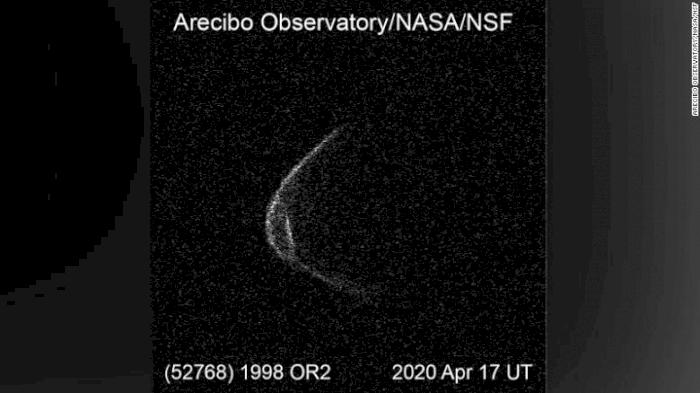This asteroid is practicing physical distancing and wearing a mask
- Wednesday April 29 2020
- General SCI
A a big — very big — asteroid passed through Earth’s neighborhood today!
Asteroid (52768) 1998 OR2 passed at a safe physical distance of about 4 million miles. Its closest approach was at 4:56 am CDT on Wednesday, April 29.
To put that distance into better perspective, imagine the space between the Earth and the Moon. In that distance, you could fit 30 Earth-sized planets. Asteroid 1998 OR2 is about 16x farther away from Earth than our moon, meaning you could fit 480 Earths between us as the asteroid!
According to current estimates, it's probably a bit over a mile wide.
Traveling at about 19,000 miles per hour and rotating on its axis once every four hours, radar images show that asteroid 1998 OR2 is mostly spherical and, at some angles, even appears to be wearing a face mask!
Although this asteroid is categorized as “potentially hazardous," there is no threat of an impact on Earth. Objects classified as “potentially hazardous" must be within about 20 Moon distances from Earth and have an absolute magnitude of at least 22 or smaller (the smaller the number, the higher the brightness).
As we saw, though, asteroid 1998 OR2 is much too far away to be a cause for concern.
This flyby was the most significant approach of an asteroid until 2027, when asteroid (4953) 1990 MU will safely pass by Earth at 12 lunar distances.
We can learn so much from studying visits of nearby asteroids. The information we learn can help further space exploration, investigate resourcing mining and simply learn more about the origin of the solar system.
Most importantly, the more we learn about asteroids, the more we can understand their origins, track their orbits and keep the Earth safe.
Follow SCI on social media or visit www.sciowa.org/astronomy to learn more about space exploration and astronomical occurrences.

